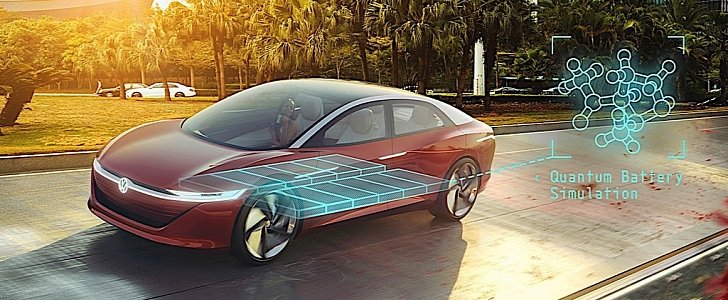The advancements made in the field of quantum computers opens new research and development opportunities for carmakers. Several high-profile companies in the industry have already said they are trying to make use of the new technology.
The latest such company is Volkswagen, which on Thursday said it is using a quantum computer to create a new high-performance electric vehicle battery.
The ultimate goal is to make a configurable blueprint for batteries, one that can be used to simulate the chemical composition of a battery based on weight reduction, maximum power density or cell assembly, all wrapped in a production-ready design.
So far, the research is in its early stages, Volkswagen’s engineers taking baby steps. They managed for now to model lithium-hydrogen molecules and carbon chains on quantum computers.
“We are working hard to develop the potential of quantum computers for Volkswagen. The simulation of electrochemical materials is an important project in this context,” said Florian Neukart, Volkswagen’s head scientist in San Francisco.
"In this field, we are performing genuine pioneering work. We are convinced that commercially available quantum computers will open up previously unimaginable opportunities. We intend to acquire the specialist knowledge we need for this purpose now.”
The research is a result of a partnership with Google announced by the Germans in November last year. The IT giant is helping the carmaker develop new products in the field of batteries, but also assists with traffic optimization and machine learning processes.
Google is also involved in similar projects with Daimler, with whom they are testing the 72-qubit Bristlecone chip in several of Daimler’s manufacturing processes.
Quantum computers are immensely powerful machines that take advantage of the fact that subatomic particles exist in more than one state at any time. By storing a lot more information, they are able to run much faster, provide better results and solve problems more efficiently than classic computers.
The ultimate goal is to make a configurable blueprint for batteries, one that can be used to simulate the chemical composition of a battery based on weight reduction, maximum power density or cell assembly, all wrapped in a production-ready design.
So far, the research is in its early stages, Volkswagen’s engineers taking baby steps. They managed for now to model lithium-hydrogen molecules and carbon chains on quantum computers.
“We are working hard to develop the potential of quantum computers for Volkswagen. The simulation of electrochemical materials is an important project in this context,” said Florian Neukart, Volkswagen’s head scientist in San Francisco.
"In this field, we are performing genuine pioneering work. We are convinced that commercially available quantum computers will open up previously unimaginable opportunities. We intend to acquire the specialist knowledge we need for this purpose now.”
The research is a result of a partnership with Google announced by the Germans in November last year. The IT giant is helping the carmaker develop new products in the field of batteries, but also assists with traffic optimization and machine learning processes.
Google is also involved in similar projects with Daimler, with whom they are testing the 72-qubit Bristlecone chip in several of Daimler’s manufacturing processes.
Quantum computers are immensely powerful machines that take advantage of the fact that subatomic particles exist in more than one state at any time. By storing a lot more information, they are able to run much faster, provide better results and solve problems more efficiently than classic computers.

